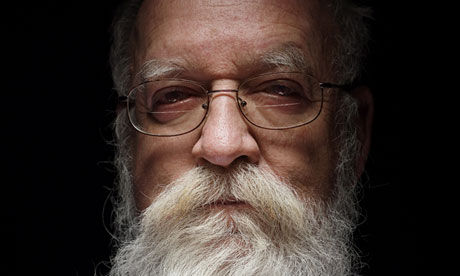
© Peter Yang/August Daniel Dennett: 'Often the word "surely" is as good as a blinking light locating a weak point in the argument.'
We have all heard the forlorn refrain: "Well, it seemed like a good idea at the time!" This phrase has come to stand for the rueful reflection of an idiot, a sign of stupidity, but in fact we should appreciate it as a pillar of wisdom. Any being, any agent, who can truly say: "Well, it seemed like a good idea at the time!" is standing on the threshold of brilliance. We human beings pride ourselves on our intelligence, and one of its hallmarks is that we can remember our previous thinking and reflect on it - on how it seemed, on why it was tempting in the first place and then about what went wrong. I know of no evidence to suggest that any other species on the planet can actually think this thought. If they could, they would be almost as smart as we are. So when you make a mistake, you should learn to take a deep breath, grit your teeth and then examine your own recollections of the mistake as ruthlessly and as dispassionately as you can manage. It's not easy. The natural human reaction to making a mistake is embarrassment and anger (we are never angrier than when we are angry at ourselves) and you have to work hard to overcome these emotional reactions.
Try to acquire the weird practice of savouring your mistakes, delighting in uncovering the strange quirks that led you astray. Then, once you have sucked out all the goodness to be gained from having made them, you can cheerfully set them behind you and go on to the next big opportunity. But that is not enough: you should actively seek out opportunities just so you can then recover from them.
In
science, you make your mistakes in public. You show them off so that everybody can learn from them. This way, you get the benefit of everybody else's experience, and not just your own idiosyncratic path through the space of mistakes. (Physicist Wolfgang Pauli famously expressed his contempt for the work of a colleague as "not even wrong". A clear falsehood shared with critics is better than vague mush.)
This, by the way, is another reason why we humans are so much smarter than every other species. It is not so much that our brains are bigger or more powerful, or even that we have the knack of reflecting on our own past errors, but that we share the benefits our individual brains have won by their individual histories of trial and error.
I am amazed at how many really smart people don't understand that you can make big mistakes in public and emerge none the worse for it. I know distinguished researchers who will go to preposterous lengths to avoid having to acknowledge that they were wrong about something. Actually, people love it when somebody admits to making a mistake. All kinds of people love pointing out mistakes.
Generous-spirited people appreciate your giving them the opportunity to help, and acknowledging it when they succeed in helping you; mean-spirited people enjoy showing you up. Let them! Either way we all win.


Comment: Ignore Ronson and Fallon's 'insights'; they're muddying the issue, intentionally or not.
Most psychopaths are very difficult to spot, so there's no point in trying. Instead try to learn all you can about them. Besides Hare and Babiak's work as a good introduction to the topic, there is also Dr. Martha Stout's work.
While it's tempting to seek a silver lining about this bleak revelation that psychopathy has reached pandemic levels, we would caution against thinking that because they're CEOs, doctors, lawyers and soldiers, they're successful and therefore 'good'.
What if the war those soldiers are waging is illegal (brought about by high-level psychopaths - Blair & Bush, anyone?) - is their 'service' still 'good'? What if the 'work' those CEOs produce is destroying a country's economy, draining people's wealth and leading to massive bonuses for a few while starving the rest?
'Successful' when applied to psychopaths doesn't mean they're productive members of society; it means they've successfully hidden their alien condition, which is all the better for preying on unaware people. When you get down to it, the world has only one root problem from which all else stems: psychopaths.